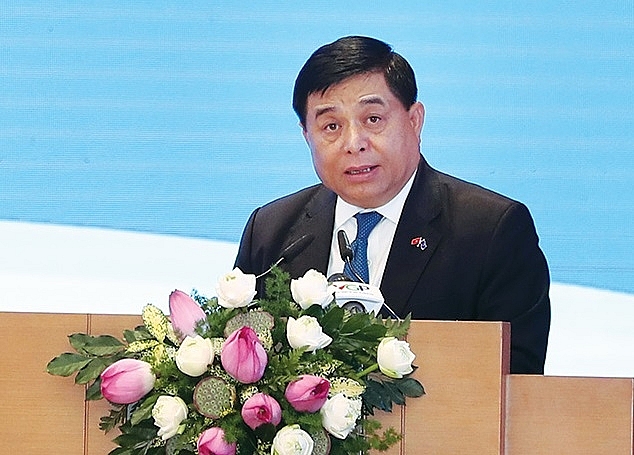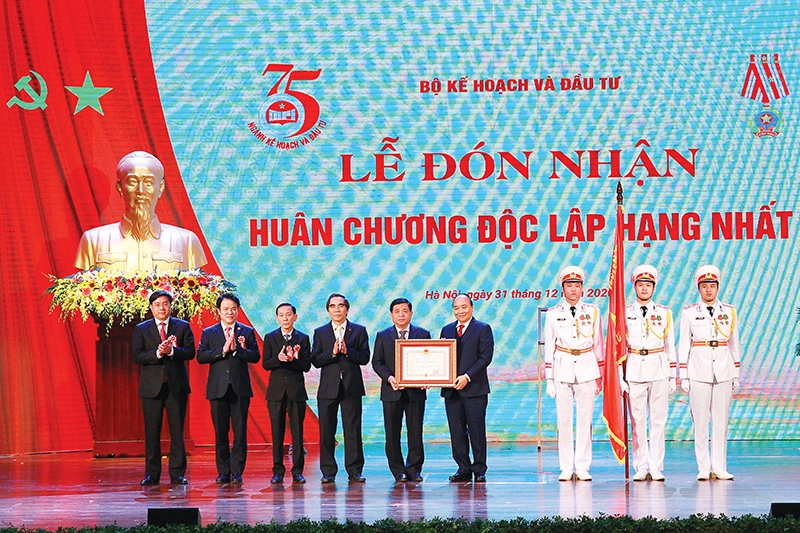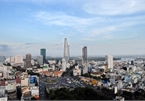Minister of Planning and Investment Nguyen Chi Dung writes about the development journey of the ministry in the country’s socioeconomic development.
 |
|
Minister of Planning and Investment Nguyen Chi Dung
|
The year 2020 has ended along with some great achievements of the economy despite the pandemic and floods. While the global economy is suffering under recession, Vietnam is one of the highest-growth economies in Asia, reporting positive growth, and reaching eight of the 12 socioeconomic development indicators that the National Assembly set forth.
The position and reputation of Vietnam have been improving significantly after preventing and successfully fighting the pandemic as well as maintaining economic development.
Looking back at the last decade, especially the last three years, we are proud of the results we achieved. The economy has recovered, inflation is controlled, the macroeconomy has improved remarkably, and growth is driven by quality, efficiency, productivity, and competitiveness. There are several positive outcomes in restructuring the economy and implementing national strategies, while the investment and business climate has been improving notably.
We are also proud that our ministry and its departments have contributed their part to the achievements of the country. Over the last 75 years, as the government agency providing general advice on strategies, generations of leaders, officers, and staff have been innovating their mindsets and doing their best to accomplish all tasks set forth to confirm our role as the “chief architect of the economy”.
We understand the context of analysing and providing forecasts and general advice for different economic scenarios and macroeconomic solutions to enable our economy to overcome difficulties, while maintaining positive growth even throughout hard times like the pandemic.
The planning and investment sector has contributed significantly to reforming institutions, restructuring the economy, renewing growth models, and improving the investment and business climate. For example, important policies have been proposed to the Party and the state, including Resolution No.50-NQ/TW of on orientations to perfect policies and raise the quality and efficiency of foreign investment by 2030; and Resolution No.52-NQ/TW on policies on the nation’s proactive involvement amid the Fourth Industrial Revolution, as well as the establishment of the Vietnam Innovation Network and the National Innovation Centre.
However, we also need to be aware of our surroundings. GDP per capita sits at around $3,500 at present, with much improvement since 1990. But currently, Vietnam is still a low-middle income country that ranked 127th out of 217 nations in 2019 and is facing a middle-income trap, with its optimum population ageing.
On the other hand, there are a lot of opportunities for Vietnam to upsurge and catch up with developed countries thanks to Industry 4.0, the relocation of global supply chains, and new trends that emerged during the pandemic. Thus, it is an important moment for Vietnam to provide and implement strategies and policies for the country’s development.
On the contrary, if we do not seize these opportunities and renew our mindsets quickly, the risk of lagging in development will be increasingly larger.
 |
By 2025, the 50th anniversary of the National Reunification Day, Vietnam targets to become an industrial country and improve our people’s income. By 2030, the 100th anniversary of the establishment of the Communist Party, we will be a developing country with a modern industry and the status of an upper middle-income country.
The more and higher our targets are set, the more challenging the tasks of the whole planning and investment sector are going to be. However, we remain confident as we successfully helped constructing the economy during the last 75 years of development, and we will continue to do so in the time to come.
 |
|
Victoria Kwakwa - Vice president of East Asia and Pacific, World Bank
|
The Ministry of Planning and Investment (MPI) has played a pivotal role in Vietnam’s transition from a closed and centrally-planned economy to the vibrant open market economy it is today.
Since the beginning of doi moi in 1986, the MPI has helped shaping the country, translating the vision of Vietnam’s leadership into evidence-based development strategies and plans as the basis for action.
Early in the reform process, the MPI led the way in quickly establishing key elements of the legal and policy framework for an open market economy. The Law on Foreign Investment of 1987, the Law on Companies of 1990, and the Law on Private Enterprise from the same year introduced bold reforms to level the playing field and support reforms of state-owned enterprises and are thus hallmarks of the MPI’s achievements.
The consultive meetings led by the MPI and the World Bank over the last decades supported Vietnam’s opening by instituting a coordinated engagement with the global development community. These meetings fostered mutual understanding and trust, and mobilised significant resources in support of the country’s reforms and development agenda – the MPI was at the centre of all of this.
In the aftermath of the Asian financial crisis, the MPI continued to support the development of the private sector by co-leading with the International Finance Corporation the Vietnam Business Forum (VBF) as an effective platform for dialogue and problem solving between the government and foreign and domestic enterprises. The VBF continues and has made an important difference in promoting better understanding between the government and the private sector.
More recently, the MPI’s accomplishments include groundbreaking analyses such as the Vietnam 2035 report, prepared jointly with the World Bank, to examine what it would take for the country to become a successful upper middle-income economy by 2035.
Over its 75 years of existence, mirroring Vietnam’s experience, the MPI has also transformed from the State Planning Committee with binding plans of material social production into the current MPI with indicative strategic plans. It has introduced a range of institutional reforms and the meetings have now been transformed into a platform for policy dialogue with high-level government participation.
As Vietnam continues its journey towards prosperity, creativity, equity, and democracy, it faces more complex challenges. The labour-intensive, export-driven growth model may be reaching its limits, and the population is ageing rapidly, while the country’s carbon footprint is expanding quickly with heavy tolls on lives and livelihoods.
The MPI will need to continue its transformation to ably lead in shaping Vietnam’s medium- and long-term strategic development and reform priorities in the face of these ever-more complex challenges. This will require new ideas and thinking outside the box, new skills, and new ways of doing things with greater agility in today’s rapidly changing global context.
Given its track record of success over the last 75 years, I am confident that the MPI will draw on the past lessons to allow it to adapt and break new ground going forward.
The MPI has been a long-standing and trusted partner of the World Bank, and we look forward to continuing and deepening our partnership in the years ahead.
|
Nguyen Xuan Phuc - Prime Minister During the past 75 years, the planning and investment sector has completed all missions assigned by the state and the government. The most outstanding achievement is that it was trusted to be the leader in building socioeconomic development strategies during the country’s long-term and mid-term development period. These strategies are considered the country’s development guidelines and help to concretise Party policies in every 10-year period. The sector also acts as an advisor and proposes breakthrough planning in order to reform the economy to be suitable with the country’s growth, including the national strategy on the Fourth Industrial Revolution, planning of the National Innovation Centre, and more besides. It takes the lead in studying and implementing policies and state management in terms of investment; and has also completed the mission in statistics work and data analysis to serve for activities of the government, state, ministries, and local authorities. Thanks to these efforts, the sector has been honoured with a gold star medal and Ho Chi Minh medal from the Party and the state, in collaboration with many other awards. The Ministry of Planning and Investment must continue to offer suggestions in order to create breakthrough for socioeconomic targets for 2021 and beyond. Truong Tan Sang - Former State President During Vietnam’s development progress from a centrally-planned subsidised economy to a market economy, the planning and investment sector contributed an important part towards building and protecting the country. However, it is necessary to see that globalisation and international integration are presenting challenges much different from the previous context and the early doi moi period as we now face stricter criteria for success. During the more than 30 years of national renovation, Vietnam succeeded in implementing many changes. Especially, amid the pandemic, we can be proud of the achievements we acquired in preventing and controlling the outbreaks. Thus, we can absolutely believe that we will overcome competition in the new context and can be confident to step into the new development period of 2030-2045, when we can celebrate 100 years of establishing the Party and the country. I also believe that with the available tradition and experience of the planning and investment sector, people will continue to promote our advantages to contribute to the country’s socioeconomic growth. I hope that many outstanding people will be honoured at the 100th anniversary ceremony of establishing the country. Vu Khoan - Former Deputy Prime Minister In the war, the planning and investment sector was able to mobilise domestic power sources and aid from socialist countries in order to both build the north and unify the country. In a peaceful context, one achievement was the task of controlling inflation and drafting the first Law on Foreign Investment, which opened the process of global economic integration. I was also impressed with the effort and close combination of leaders in mobilising official development assistance. Today, the country’s senior leaders are smart, enthusiastic, and innovative in building policies, while simultaneously staying consistent amid huge pressure. Today and in the future, the socioeconomic situation of the country and the world will see a lot of changes, requiring strong renovation from the planning and investment sector. Notably, it will have to grasp unpredictable movements on both domestic and international markets. I hope that members of the sector will thoroughly make use of their many talents in collaborating with the state to effectively regulate these changes for the sake of the country’s socioeconomic development, while simultaneously realising the nation’s dreams and aspirations. VIR |

Vietnam to become world’s 19th largest economy by 2035: CEBR
Vietnam’s economy is expected to move to the 19th position in the rankings of the World Economic League Table in 2035, according to the Centre for Economics and Business Research (CEBR).

Vietnam's economy to grow 6.8 percent in 2021: World Bank
Vietnam’s prospects appear positive as the economy is projected to grow by about 6.8 percent in 2021 and, thereafter, stabilise at around 6.5 percent, according to the latest World Bank’s economic update for Vietnam “Taking Stock”.